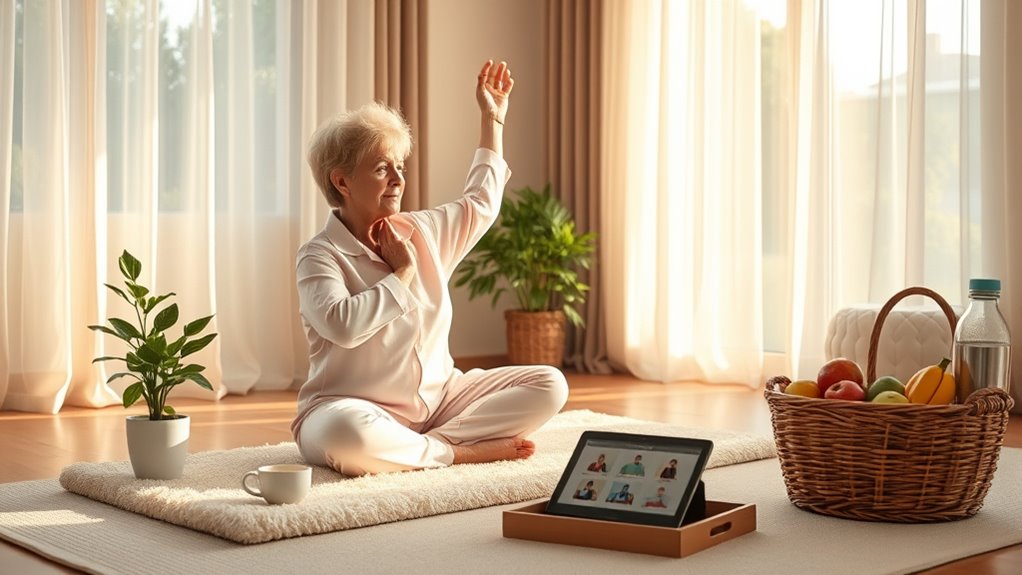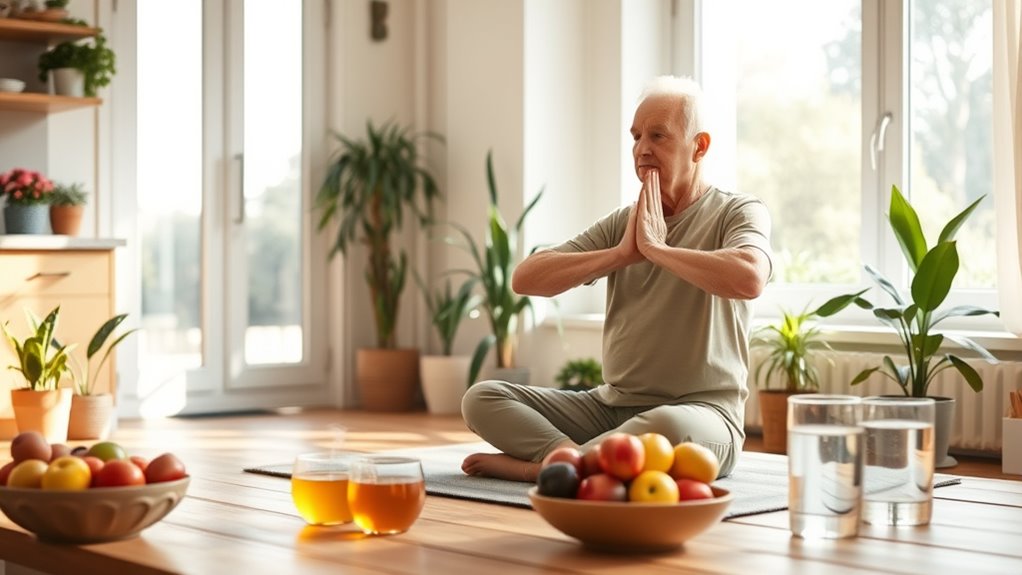To build a daily wellness routine as an aging adult, focus on balancing physical activity, mental stimulation, and social connection. Incorporate activities like walking, puzzles, or learning new skills, while maintaining regular social contact with friends and family. Establish consistent routines for meals, exercise, and relaxation, and prioritize sleep and hydration. Adjust your activities as needed to stay engaged and motivated. Continue exploring these steps to create a personalized plan that promotes independence and overall well-being.
Key Takeaways
- Incorporate mentally stimulating activities like reading or puzzles to support cognitive health.
- Establish a consistent daily schedule including physical activity, social engagement, and relaxation.
- Personalize routines based on individual preferences, abilities, and health needs.
- Ensure balanced nutrition, hydration, and regular exercise to promote overall wellness.
- Monitor wellbeing regularly and adjust activities to maintain motivation and address changing needs.

As we age, establishing a consistent daily wellness routine becomes essential for maintaining health, independence, and quality of life. One of the most important aspects of this routine is supporting your mental health. Mental well-being affects how you think, feel, and handle daily challenges. To nurture this, incorporate activities that stimulate your mind, like reading, puzzles, or learning a new skill. These activities help keep your brain active and may reduce the risk of cognitive decline. Additionally, practicing mindfulness or meditation can ease stress and promote emotional resilience. Avoiding excessive screen time and ensuring you get enough sleep also play indispensable roles in maintaining mental clarity and emotional balance. Staying hydrated is crucial; water intake aids in maintaining optimal brain function.
Social engagement is equally indispensable when building your daily wellness routine. Staying connected with others fosters a sense of belonging and purpose, which are indispensable for mental health. Make it a point to reach out to friends and family regularly—whether through phone calls, video chats, or in-person visits. Participating in community activities, like senior centers or hobby groups, can expand your social circle and prevent feelings of loneliness. Volunteering your time not only helps others but also boosts your own sense of fulfillment. When you engage socially, you reinforce your support network, which is essential during life’s inevitable changes and challenges.
Creating a balanced routine involves setting aside specific times for mental and social activities daily. For example, you might start your morning with a brief meditation session or journaling to set a positive tone. In the afternoon, schedule a walk in your neighborhood or a virtual coffee chat with a friend. Consistency is key; it helps your brain anticipate and adapt to your routine, making these activities feel natural and rewarding. Don’t forget to include physical activity, which complements mental and social health by releasing endorphins and improving overall well-being. Incorporating antioxidant-rich berries can also support cognitive health and overall vitality.
Finally, listen to your body and mind. If certain activities no longer feel enjoyable or feasible, adapt them accordingly. Seek professional guidance if you notice persistent mood changes or social withdrawal. Building a daily wellness routine tailored to your needs not only enhances your mental health and social engagement but also empowers you to maintain independence and enjoy life to the fullest as you age.
Frequently Asked Questions
How Can I Motivate an Aging Adult to Stick to Their Routine?
To motivate an aging adult to stick to their routine, use motivation strategies like setting small, achievable goals and celebrating progress. Encourage them to find accountability partners, such as family or friends, who can offer encouragement and check in regularly. Keep routines enjoyable and flexible, so they don’t feel overwhelmed. Your support and positive reinforcement will help them stay committed and motivated over time.
What Are the Best Ways to Adapt Routines for Cognitive Decline?
Adapting routines for cognitive decline is like adjusting a map as you explore new territory. You should include simple cognitive exercises and memory enhancement activities, like puzzles or storytelling, to keep the mind active. Break tasks into smaller steps, use visual cues, and maintain consistent schedules. These tweaks help your loved one stay engaged and retain independence, making their daily routine more manageable and enjoyable.
How Do I Handle Resistance From Seniors Hesitant to Change?
You can handle resistance from hesitant seniors by using motivational interviewing techniques to explore their feelings and gently guide them toward change. Offer behavioral incentives that resonate with their interests, making new routines more appealing. Show empathy and patience, emphasizing their independence and choices. This approach helps build trust, reduces resistance, and encourages them to embrace wellness activities at their own pace.
Are There Specific Routines for Managing Chronic Illnesses?
Managing chronic illnesses requires a tailored routine you can’t ignore. Focus on nutritional planning to guarantee your body gets essential nutrients daily, and incorporate gentle physical therapy to boost mobility and reduce pain. You might feel like you’re tackling an impossible puzzle, but consistency makes a difference. Prioritize small, manageable steps—like daily stretches and healthy meals—and watch your health improve dramatically, one step at a time.
How Can Technology Support Daily Wellness for Seniors?
Technology supports your daily wellness by making it easier to stay active and safe. A smart home can remind you to take medications, adjust the lighting, or notify loved ones if needed. Wearable devices track your health metrics like heart rate and activity levels, helping you stay connected to your wellness goals. These tools give you independence, peace of mind, and encourage consistent self-care every day.
Conclusion
Creating a daily wellness routine can considerably improve your quality of life as you age. Remember, studies show that staying active and engaged reduces the risk of chronic illnesses by up to 50%. By incorporating simple habits like regular exercise, balanced meals, and mindfulness, you’re investing in your health and happiness. Start small, stay consistent, and enjoy the benefits of a vibrant, healthier life—it’s never too late to prioritize your well-being.








